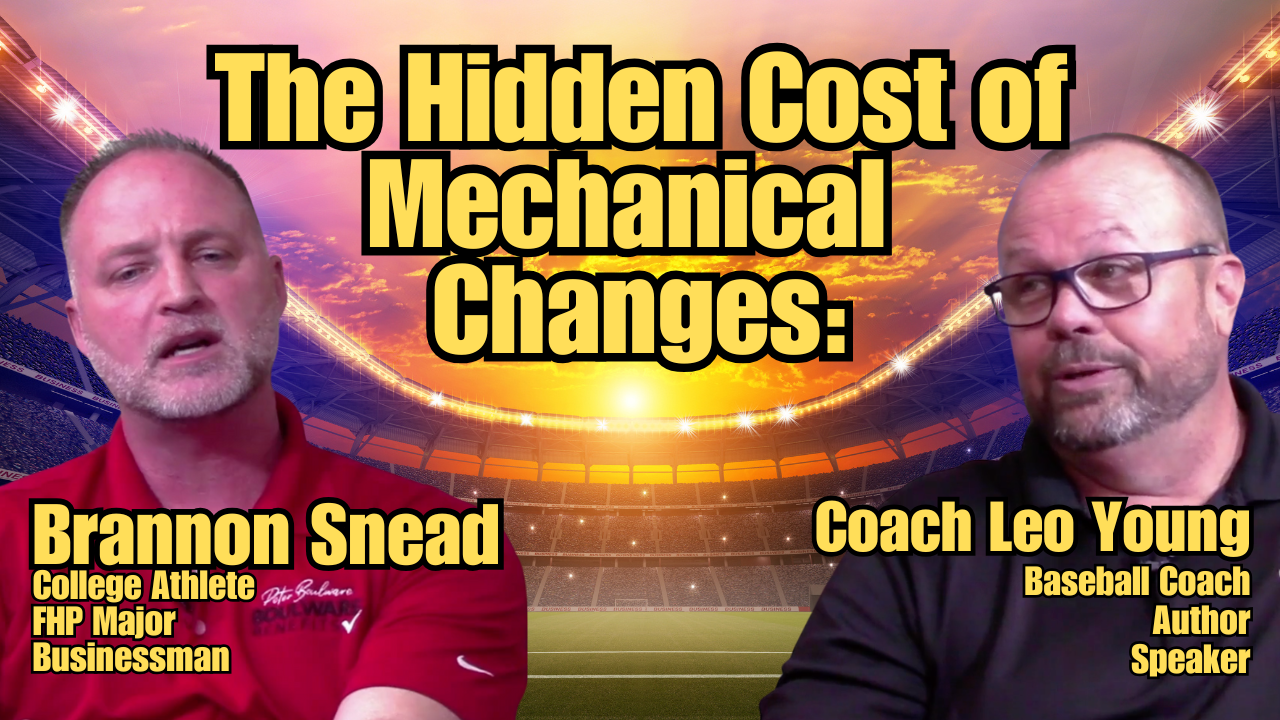The Hidden Cost of Mechanical Changes: How Coaches Can Help or Hurt a Pitcher’s Development
This blog explores the impact of mechanical changes on young pitchers and why well-intentioned coaching adjustments can sometimes disrupt performance, timing, and even long-term health. Brannon Snead’s story shows how critical it is for coaches to individualize instruction, communicate clearly, and protect what already works—before making changes that could alter everything.
FROM TRAINING TO TRIUMPH - WHAT MILITARY AND SPORTS TEACH ABOUT LEADING, WINNING, AND GROWING IN LIFE
Coach Leo Young
4/11/20252 min read


A Change with No Explanation
When coaches make changes to a pitcher’s delivery, they often believe they’re helping—but if they don’t take the time to understand the athlete’s natural movement, they can do more harm than good.
In this story, Brannon Snead, fromer college pitcher, reflects on what happened when a coach changed his pitching mechanics without clear communication or regard for what was already working.
Have you ever had a coach change something that disrupted your game? Did it help you grow—or set you back?
Drop your thoughts in the comments on this video — we’d love to hear your experience:
A Delivery That Worked
As a high school standout, Brannon had elite command and a signature over-the-top delivery inspired by Nolan Ryan and Roger Clemens. He threw over his head and straight overhand, delivering a hammer 12-6 curveball with consistent location.
He was highly recruited, and no one questioned his mechanics—because they worked.
When he got to college, a coach decided to change his arm slot to three-quarters, hoping to create more movement and conserve energy. But there was no explanation, no mentorship, and no transition plan.
Brannon complied—because he respected authority—but what followed was a domino effect.
When One Change Alters Everything
That one adjustment shifted everything:
His curveball turned into a slurve
His timing and feel were off
His preparation and recovery routine had to change
He started feeling constant soreness—something he never experienced in high school
The kinetic chain was disrupted, and the identity he had built as a pitcher was shaken.
“If you change how you throw, you have to change how you think. That’s not easy—especially for an 18-year-old.”
Why Individualized Coaching Matters
This story isn’t about resisting change—it’s about coaching with care and intention. If mechanics need to be modified, athletes deserve:
A clear understanding of why
Coaching support through the transition
Adjusted mental and physical preparation
A plan that works with their natural strengths, not against them
At Sore to Soaring, we emphasize individualized development, mentorship, and recovery-based coaching systems—because every pitcher is unique, and coaching must reflect that.
Key Takeaways
Mechanical changes must be individualized and explained
One adjustment can disrupt timing, recovery, and mindset
Coaches must teach the why, not just the what
Mentorship matters as much as mechanics
A pitcher’s identity is part of their performance—don’t erase it
Watch the full-length podcast episode:
Support our mission:
We’re building programs that help young athletes grow on and off the field.
Learn more or support the mission at:
Disclaimer:
The views shared are those of the guest and do not represent an endorsement by Lupos Initiative Inc., DBA Sore to Soaring. This content is for informational purposes only and not medical or training advice. Always consult a qualified professional before starting any exercise or throwing program. No affiliation or compensation exists between Sore to Soaring and any for-profit entity mentioned
If you wish to learn more about Brannon Snead’s work, visit Peter Boulware Toyota at: peterboulwaretoyota.com.
#SoreToSoaring #SoreToSoaringPodcast #BrannonSnead #PitchingDevelopment #ThrowingMechanics #CoachingMatters #AthleteDevelopment #BaseballCoaching #YouthBaseball #ArmCare #BaseballPerformance #ChangeTheMindset #KineticChain #InjuryPrevention #IndividualizedCoaching #NolanRyan #RogerClemens #PlayerDevelopment #MechanicsMatter

